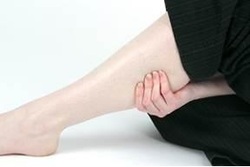 Have you ever had a good night’s sleep interrupted by a stabbing pain through the calf of your leg? Have you ever been gripped by agonizing spasms in your lower back that threatened to knock you down? When a muscle tightens without you “telling it to” and just won't relax despite your best efforts, you are suffering a muscle cramp. Most muscles in your body are what are called "voluntary" muscles. These can usually be contracted and relaxed in order to control your arms, legs, fingers, neck, posture and more. Even the simplest movements are a highly synchronized sequence of muscle contractions and relaxations. A muscle—or even a few fibers of a muscle—that contracts without conscious control, is having a spasm. When such a muscle remains powerfully contracted for an extended period of time, it becomes a cramp and the muscle becomes visibly hardened.
A muscle cramp can involve part of a muscle, the entire muscle or a group of muscles. It can last anywhere from a few seconds to several minutes—and sometimes far longer. Some children can experience cramps, but it is more common with adults, especially as they age. Nearly everyone experiences a cramp at some time in their life. All of the skeletal muscles that we use to move our body are subject to cramping. Perhaps the most frequent cramp is in the calf of the leg—what is commonly called a "charley horse." So what causes these cramps? Vigorous movement when the body is not used to such activity can result in muscle fatigue and cramping. You can reduce the risk of cramps by gently stretching the muscles before and after any activity to warm up and cool down. Also, build up to the activity slowly. Don't go from zero to peak exertion right away. Let your muscles get used to the change in activity. Also, do your best to be consistent with your exercise regimen. On-again, off-again workouts can increase the risk of cramps. Remember—good exercise habits build flexibility, balance and coordination as well as stamina and strength. that don’t build flexibility as well as strength and , otherwise you might confuse your muscles, resulting in greater risk of cramps. But exercise isn’t the only thing that can trigger a muscle cramp. What about those spasms that start while you’re asleep and wake you up in the middle of the night? If you tend to get cramps while you sleep, then try stretching your muscles before going to bed. A chemical imbalance in your body can also result in cramps—especially if you’ve been under a lot of stress or not eating a healthy, balanced diet (or both). Your nervous and musculoskeletal systems rely on a combination of specific nutrients for muscle control. Vitamin B, plus calcium, magnesium and potassium can help restore the chemical balance within your body. Natural sources are always the best. Bananas, raw avocados and cooked spinach are great for extra potassium and other nutrients. Staying hydrated with electrolytes can help prevent or alleviate cramping. Some athletes even swear by drinking sour pickle juice for its minerals! You should also be aware that a thyroid condition, diabetes or certain medications can also increase the risk of cramps. If you’re experiencing frequent or unusual muscle spasms that seem unrelated to exercise or diet (especially if you’re aware of other health problems or are taking prescription medications), you should consult your physicians about your symptoms.
3 Comments
11/10/2022 10:43:01 am
<a href="http://www.authoritydietproducts.com">authoritydietproducts</a>
Reply
11/10/2022 11:11:43 am
<a href="http://www.findbodyinshape.net">Do Legal Steroids Work</a>
Reply
5/25/2023 11:42:35 pm
A pivoting heel strap ensures a secure fit and can be worn forward or back for versatility.
Reply
Leave a Reply. |
AuthorPosted by Dr. Babak Missaghi Archives
August 2017
Categories
All
|

 RSS Feed
RSS Feed
